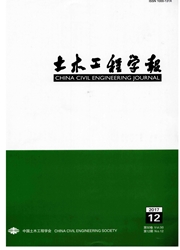

 中文摘要:
中文摘要:
对地震作用下建筑结构的振动控制方法进行研究,指出传统的集中控制策略在高层结构控制器设计中的局限性,阐述采用分散控制策略进行控制器设计的必要性及适用性。基于经典最优控制算法原理,导出两种分散控制算法——分散次优控制(Decentralized Sub-Optimal Control,DSOC)算法及分散经典最优控制(Decentralized Classic Optimal Control,DCOC)算法。引入多市场概念,提出基于多市场机制的控制(Multi-Market Based Control,MMBC)算法并应用于高层结构分散控制中。对一高层受控结构进行数值计算与分析,结果表明采用分散控制策略与集中控制策略一样能有效地抑制结构振动反应,相对于集中控制的单一失效分散控制使系统的可靠性更强;显示MMBC算法较DSOC与DCOC算法具有参数选取简便、控制效果显著等优点,能较好地适用于高层结构分散控制器设计。
 英文摘要:
英文摘要:
Methods for control of structural vibrations is studied. The limitation of the application of traditional centralized control strategy in controller design of high-rise structures is pointed out, and the necessity and applicability of decentralized control strategy for controller design is expounded. Two decentralized algorithms, decentralized sub-optimal control (DSOC) algorithm and decentralized classic optimal control (DCOC) algorithm, have been derived from the principles of classic optimal control algorithm. By introducing the multi-market concept into the Market-Based Control (MBC) theory, an algorithm named Multi-Market Base Control (MMBC) has been presented for the decentralized control of structural vibrations. A 20-storey structure is used for comparing the performance of the two control strategies. The results indicate that the decentralized control strategy could effectively mitigate structural vibration as well as the traditional centralized control strategy but is superior in enhancing the reliability of the control system. It is also shown that, compared with DSOC and DCOC algorithm, the proposed MMBC algorithm is more suitable for the decentralized controller design of high-rise buildings, thanks to its simpler parameter selection and better control effect.
 同期刊论文项目
同期刊论文项目
 同项目期刊论文
同项目期刊论文
 期刊信息
期刊信息
